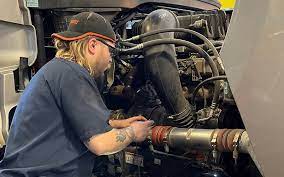Striking a Balance: The Art of Diesel Tuning for Long-Term Durability
Diesel tuning, often hailed for its ability to enhance performance, raises pertinent questions regarding its effects on the durability and longevity of diesel engines. At its core, diesel tuning involves modifying the engine’s electronic control unit (ECU) to optimize parameters such as fuel injection timing, air-fuel ratios, and turbocharger boost pressure. While this process can yield significant improvements in horsepower, torque, and fuel efficiency, its implications for engine longevity require closer examination. Diesel Mechanic will tell you more!
When diesel engines undergo tuning, they operate at higher levels of performance than originally intended by the manufacturer. This increased power output places additional stress on various engine components, including pistons, connecting rods, and the turbocharger assembly. Consequently, the engine experiences greater mechanical wear and tear over time, potentially compromising its longevity if not properly managed.

One key consideration in diesel tuning is achieving the optimal balance between performance gains and preserving engine reliability. While aggressive tuning may deliver impressive horsepower gains in the short term, it can also accelerate wear on critical engine parts, leading to premature failure and costly repairs down the line. Conversely, conservative tuning approaches prioritize engine longevity by limiting power increases to levels deemed safe for sustained operation.
Navigating the realm of diesel tuning requires a nuanced understanding of engine dynamics and performance trade-offs. Tuning professionals employ a range of strategies to optimize engine performance while safeguarding longevity, including careful calibration of fuel delivery, ignition timing, and turbocharger boost levels. By fine-tuning these parameters, tuners can extract additional power from the engine without compromising its long-term reliability.
Furthermore, advancements in tuning technology have enabled the development of sophisticated engine management systems that offer greater precision and control over performance modifications. Features such as adaptive learning algorithms and real-time data logging allow tuners to monitor engine vitals and adjust tuning parameters accordingly, ensuring optimal performance under varying operating conditions.
In conclusion, the impact of diesel tuning on engine longevity is a multifaceted issue that hinges on achieving the right balance between performance and durability. While tuning can unlock significant horsepower gains, its effects on engine reliability necessitate careful consideration and expert calibration. By leveraging the latest tuning techniques and technologies, enthusiasts can enjoy enhanced performance without sacrificing the long-term durability of their diesel engines.
